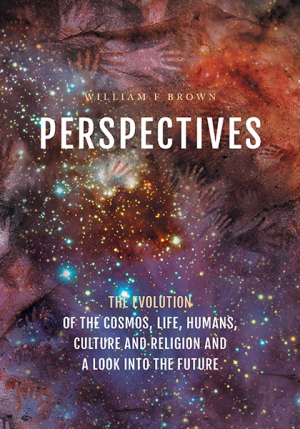
Perspectives
The Evolution of the Cosmos, Life, Humans, Culture and Religion and a Look into the Future
Perspectives is a glorious read; it’s simultaneously vast and intimate, exhaustively detailed and relentlessly universal.
For lovers of knowledge, William Brown’s latest title, Perspectives, reads like a rapturous symphony. It rises and swells in awesome scope, an almost overwhelming amount of information, yet remains, for the most part, assuredly conducted by a seasoned, studied, and often poetic intellect.
Brown is a neuroscientist and author of several textbooks. Perspectives focuses on evolution in almost every sense of the concept. The book begins with an exploration of the cosmos, primordial energies and matter, the birth and “ancestry” of stars, the formation of planets, and the complex interactions between inorganic and organic compounds that led to life on Earth and a diversity of species. The book then traces the evolution of human beings, the intricate development of the human brain, the emergence of symbolic language, art, culture, mythologies, religions, and science.
That Perspectives authoritatively analyzes evolution at both the cosmic and molecular level evinces its sweeping ambition. It’s an ambition fully realized not only by incisive explication and demonstrative tables, but also by some wonderfully instructive figurative language. The Big Bang, for example, is described as an “incredible inflationary rush.” Humans engaged in longstanding conflicts are described as being separated by tribal, cultural, and religious “silos,” a word evoking fixed agricultural society and the kind of “hierarchical authority” discussed at length in the book, from the “competitive sorting” of nerve cells to religious king-gods that ruled ancient cultures.
Even some of the chapter titles are inventive. The chapter on the development of the human brain—the author’s expertise—is wittily called “The Biological iPad.” Other parallels are drawn between immemorial times and modern life, including the way contemporary presidential debates mirror primitive body language. In contrast to other species, humans, the book argues, evolved to be adept at two things: making tools and telling stories. The latter is a result of the brain’s natural tendency to fill in gaps in memory.
The book’s conclusion is a minor letdown, ending with a call for more atheistic humanism. Though the appeals to greater stewardship of the planet are certainly warranted and appreciated, the final presentation of all deities as “imaginary outsiders” diminishes the psychic richness of the book’s earlier sections, which offer a more relativistic and multicultural point-of-view.
Still, Perspectives is a glorious read. It’s simultaneously vast and intimate, exhaustively detailed and relentlessly universal. Brown belongs in the same league of scientists and authors as Richard Dawkins, E.O. Wilson, and Jared Diamond. He similarly tackles big questions of life and existence from a multidisciplinary approach, though he draws his own conclusions. At his best, Brown inspires us to better understand and appreciate perspectives not our own.
Reviewed by
Scott Neuffer
Disclosure: This article is not an endorsement, but a review. The publisher of this book provided free copies of the book and paid a small fee to have their book reviewed by a professional reviewer. Foreword Reviews and Clarion Reviews make no guarantee that the publisher will receive a positive review. Foreword Magazine, Inc. is disclosing this in accordance with the Federal Trade Commission’s 16 CFR, Part 255.
